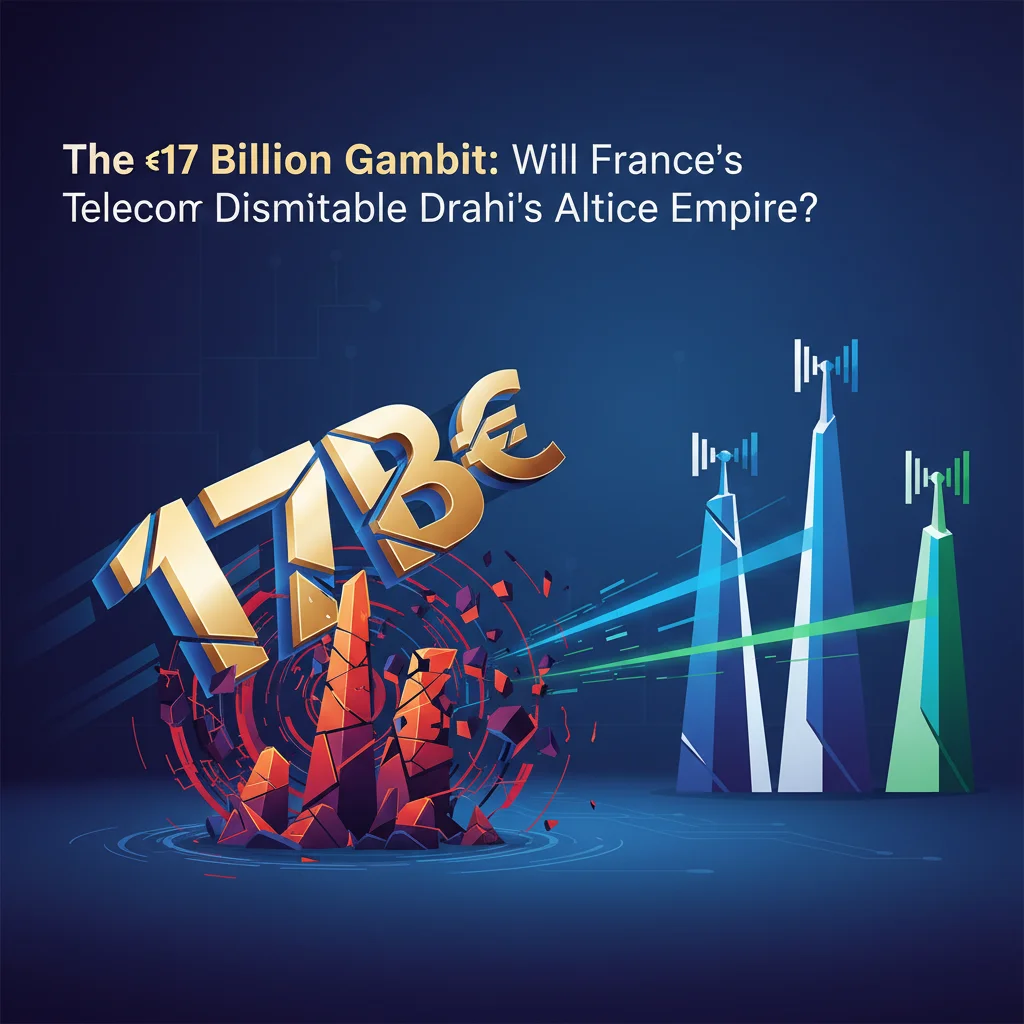
The €17 Billion Gambit: Will France’s Telecom Giants Dismantle Drahi’s Altice Empire?
In the high-stakes world of corporate finance and telecommunications, few stories are as compelling as the dramatic rise and current predicament of Patrick Drahi’s Altice. The latest chapter is a potential blockbuster: a consortium of France’s largest telecom operators—Orange, Bouygues Telecom, and Free—has reportedly tabled an informal offer of approximately €17 billion to acquire and carve up most of Altice France, whose crown jewel is the mobile and broadband provider SFR. This is not just another merger; it’s a seismic event that could reshape the European telecom landscape, resolve a multi-billion-dollar debt crisis, and mark the end of an era for one of finance’s most audacious dealmakers.
This proposed mega-deal represents a potential lifeline for Altice, an empire built on debt that is now creaking under the pressure of rising interest rates and a sprawling corruption investigation. For investors, business leaders, and anyone interested in the intersection of finance, technology, and economics, this story is a masterclass in corporate strategy, risk, and the relentless forces of the market.
The Architect and the Mountain of Debt
To understand the significance of this €17 billion offer, one must first understand Patrick Drahi. The Franco-Israeli billionaire is a legendary figure in the world of leveraged buyouts (LBOs). His strategy has been consistent and, for a time, spectacularly successful: acquire telecom assets using vast amounts of borrowed money, aggressively cut costs, and integrate them into his ever-expanding global portfolio. This approach allowed him to build a transatlantic empire that includes France’s SFR, assets in Portugal and Israel, and Altice USA.
However, the foundation of this empire—debt—has become its greatest vulnerability. The entire Altice group is saddled with a staggering debt load of approximately $60 billion. In an era of near-zero interest rates, servicing this debt was manageable. But as central banks around the world have hiked rates to combat inflation, the cost of this leverage has skyrocketed. The complex world of corporate banking and finance, which once fueled Drahi’s ascent, now threatens his position. The pressure from bondholders is immense, and the company’s stock market performance has reflected this deep-seated anxiety.
Compounding these financial woes is a corruption probe that erupted in Portugal, implicating one of Drahi’s closest lieutenants. The investigation has sent shockwaves through the company, raising serious questions about its procurement practices and governance. This has not only damaged Altice’s reputation but has also made refinancing its colossal debt even more challenging, as lenders and investors grow wary. For those involved in trading Altice’s bonds, the situation has become a high-stakes game of predicting Drahi’s next move.
A French Telecom Triple-Team
Sensing a moment of weakness, Altice’s primary competitors in its most crucial market have joined forces. The consortium of Orange (the former state monopoly and market leader), Bouygues Telecom (part of the powerful Bouygues industrial conglomerate), and Free (the disruptive low-cost operator founded by Xavier Niel) represents a united front of rivals. Their goal is clear: to acquire and dismantle SFR, effectively removing their most unpredictable competitor and consolidating the French market.
For years, analysts have argued that the French telecom market is overly competitive, with four major players engaged in brutal price wars that have eroded profitability and potentially hampered long-term investment in critical infrastructure like 5G and fiber optics. A move from four to three national operators has long been the holy grail for the industry, promising greater pricing power, improved margins, and a more stable environment for investing. Previous attempts at consolidation have failed, often scuttled by disagreements over valuation or insurmountable regulatory hurdles. This time, however, the unique pressures on Altice may create an opportunity that is too good to pass up.
Below is a snapshot of the key players in the French mobile market, illustrating the competitive landscape that this deal seeks to transform.
| Operator | Parent Company | Approx. Mobile Market Share (2023) | Key Strategic Position |
|---|---|---|---|
| Orange | Orange S.A. | ~35% | Incumbent leader, strong infrastructure assets |
| SFR | Altice France | ~27% | Major player burdened by parent company debt |
| Bouygues Telecom | Bouygues Group | ~19% | Aggressive challenger, part of a larger conglomerate |
| Free Mobile | Iliad | ~19% | Market disruptor, focused on low-cost offerings |
The proposed plan would involve carving up SFR’s assets—including its mobile subscriber base, network infrastructure, and retail stores—among the three buyers. This complex undertaking would require meticulous planning and, most importantly, the blessing of competition authorities.
On the other side, the consortium’s unity is not guaranteed. Carving up a national telecom operator is an operational and regulatory nightmare. How do you split a network? How do you migrate tens of millions of customers? Who gets the most valuable spectrum licenses? The French government and EU competition regulators will scrutinize this deal with a fine-tooth comb, fearing that a reduction in competition could lead to higher prices for consumers. The buyers will need to present a compelling case that the deal will ultimately benefit the French economy through enhanced investment in next-generation networks. This is far from a done deal; it’s the opening salvo in what is sure to be a protracted and fascinating corporate battle.
The Road Ahead: Hurdles, Regulators, and Financial Engineering
Even if Drahi and the consortium can agree on a price, the path to closing the deal is fraught with obstacles. The most significant of these is regulatory approval. Both French and European Union competition authorities will be intensely focused on the impact on consumers. The core principle of their analysis will be whether reducing the number of market players from four to three will substantially lessen competition, leading to a de facto oligopoly. The buyers will need to offer significant “remedies,” such as divesting certain assets or making commitments on pricing and network investment, to appease regulators. The history of European telecom M&A is littered with deals that have been blocked on competition grounds.
The financial engineering required to execute such a transaction is also immense. The deal would likely be financed through a combination of cash and debt, requiring the involvement of major investment banking institutions. The intricate process of valuing and dividing SFR’s assets—from its fiber-optic cables to its B2B enterprise division—is a monumental task. Every aspect of the company’s operations would need to be untangled and allocated among the three buyers in a way that satisfies their strategic objectives and passes regulatory muster.
Implications for Investors and the Broader Economy
For those engaged in the stock market, this potential deal has wide-ranging implications. A successful acquisition would likely be a major positive for the shares of Orange, Bouygues, and Iliad (Free’s parent company), as investors would anticipate a more rational market and improved profitability. The impact on Altice is more complex; while a sale would provide a much-needed cash injection to pay down debt, it would also mean parting with its largest and most important cash-generating asset.
The deal is also a bellwether for the broader European economy and its M&A climate. If successful, it could trigger a wave of in-market consolidation in other European countries where similar competitive pressures exist. It highlights a key theme in modern finance: the reckoning faced by companies that pursued aggressive, debt-fueled growth strategies in a low-rate environment. The shift in monetary policy has fundamentally altered the calculus of risk and reward, and Altice is a prime case study.
This saga is a powerful reminder of the interconnectedness of corporate finance, market dynamics, and macroeconomic trends. The principles of economics are on full display, from the supply-and-demand dynamics of the telecom market to the impact of interest rate policy on corporate viability.
Conclusion: An Empire at a Crossroads
The €17 billion offer for Altice France is more than just a business transaction; it’s a pivotal moment for a major European industry and a defining test for one of its most prominent figures. Patrick Drahi is at a crossroads, forced to consider selling the very asset that cemented his status as a telecom titan in order to save the empire he built. For the French telecom market, it represents a potential end to years of punishing price wars and the dawn of a new, more consolidated era.
Investors, regulators, and consumers will be watching closely as this high-stakes drama unfolds. Whether the deal proceeds or not, the underlying forces at play—the crushing weight of corporate debt, the strategic imperative for consolidation, and the ever-watchful eye of regulators—will continue to shape the future of finance and industry across Europe.


